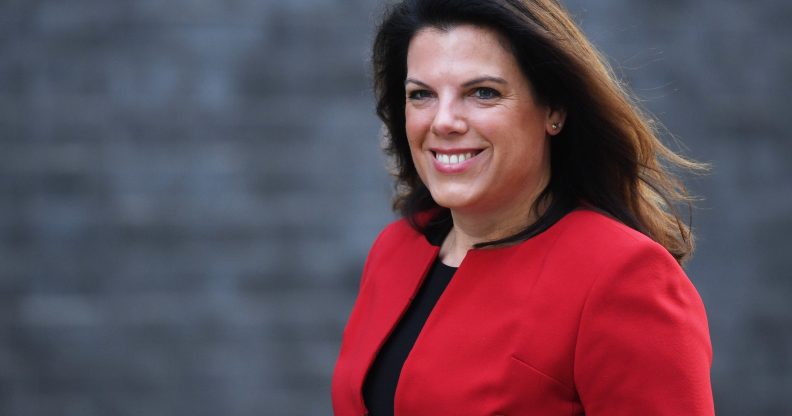MPs urged by anti-trans ‘women’s rights’ group to eliminate ‘transgenderism’ and scrap Gender Recognition Act

Caroline Nokes, chair of the Women and Equalities select committee. (Leon Neal/Getty)
A “women’s sex-based rights” campaign group has told MPs to scrap Britain’s Gender Recognition Act and eliminate “transgenderism”.
The Women’s Human Rights Campaign (WHRC), whose mission is “defending women and girls” and “preserving our sex-based rights”, was responding to an inquiry into the Gender Recognition Act (GRA) by the Women and Equalities Select Committee, chaired by Tory MP Caroline Nokes.
The GRA is a law that, since 2004, around 5,000 adult trans men and women have used to gain legal recognition of their gender. Between 2018 and 2020, heated public debate about whether to reform the act to make it more accessible to trans people became increasingly toxic, and led to groups like the WHRC forming to oppose trans rights.
Referring to the UN convention on eliminating discrimination against women and girls, WHRC said: “The convention calls for the ‘elimination of prejudices and customary and all other practices which are based on the idea of the inferiority or the superiority of either of the sexes or on stereotyped roles for men and women’ (Article 5).
“We consider that the practice of transgenderism clearly falls under this article because it is based on stereotyped roles for men and women.”
Anti-trans group claims non-binary people are a result of ‘popular culture’
In its nine-page submission, the WHRC also called for the GRA to be repealed because it is “fatally flawed” and “creates great confusion and leads to the idea that men and women can change sex”.
The 27 November submission, is, unsurprisingly, transphobic throughout – the WHRC’s co-founders are Sheila Jeffreys and Heather Brunskell-Evans, two prominent anti-trans campaigners.
Among other things, Jeffreys has criticised the “trend of fashionable transgenderism” and describes trans rights as “internet exploited sexual fetishes”; Brunskell-Evans was sacked by the Women’s Equality Party for saying it would be “abusive” for parents to support their trans kids.
The WHRC also repeat several anti-trans claims in its submission to the Women and Equalities Select Committee, including that being trans is a phase or fad – “transgenderism is a social and historical construction not a biological one, and will increase or decrease as a result of social forces” – and the disgusting, unfounded claim that trans women are sexual fetishists – “pornography called sissy hypno hypnotises men to feel as if they are women for the purpose of sexual excitement”.
They also claim that non-binary people “have been produced by popular culture and may not exist in the future”.
Supporting organisations of the WHRC, as listed on its website, include a number of prominent British anti-trans groups that strongly deny they are transphobic hate groups and are regularly platformed by the British media, as well as supporting several crowdfunded court cases against trans rights.
They include: the LGB Alliance, Transgender Trend (who intervened in Keira Bell’s case against the NHS prescribing puberty blockers), Labour Women’s Declaration, WoLF (Women’s Liberation Front, a group with links to the anti-abortion, anti-LGBT+ Heritage Foundation), Standing For Women (the group behind the “woman = adult human female” slogan, founded by Posie Parker, fan of appearing on YouTube shows with white nationalists), Safe Schools Alliance UK (which recently had an attempted case against the Crown Prosecution Service’s LGBT+ hate crime guidance for schools thrown out as “unarguable“), OBJECT (which wants to make gender-affirming healthcare illegal for anyone under the age of 25) and For Women Scot (currently fighting a legal case to exclude trans women from Scotland’s definition of woman).
These groups all opposed reforming the GRA, but many purport to support trans rights and all reject the notion that they are anti-trans or transphobic.
Women and Equalities Committee Gender Recognition Act inquiry
The GRA inquiry was launched in October, off the back of Tory equalities chief Liz Truss announcing that – despite overwhelming public support – she would not be demedicalising the process of legal gender recognition in the UK, which currently sees trans people forced to be diagnosed with gender dysphoria before being allowed to have the correct gender marker on their birth certificate.
Instead of reforming the GRA, Truss said she would reduce the fee of legal gender recognition from £140 to a “nominal amount” and place the application process online.
Weeks later, the Women and Equalities Select Committee said it would hold an inquiry into “whether the government’s proposed changes are the right ones and whether they go far enough”.
The committee has so far heard evidence from trans academics and anti-trans academics, and received hundreds of submissions of written evidence from members of the public, 295 pieces of which it has published on its website.

